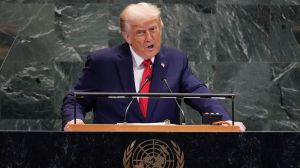Awards heed voice of `invisible women’
NEW DELHI, March 31: For one evening, women's voice in journalism got centrestage today when this year's prestigious Chameli Devi Jain Aw...

NEW DELHI, March 31: For one evening, women’s voice in journalism got centrestage today when this year’s prestigious Chameli Devi Jain Awards — for outstanding women journalists — were presented by the Media Foundation at the India International Centre.
The awards recognised three voices and visions, all distinctive but held together by their commitment to the profession: Homai Vyarawala, the grand old lady of Indian photojournalism; Pamela Philipose, Senior Editor, The Indian Express, and Vasavi, an activist and freelance writer for Jansatta and the Ranchi-based Prabhat Khabar.
Now retired and living in Vadodara, 86-year-old Vyarawalla set out to be a painter but took to the camera as an amateur in Mumbai in the 1930s. She soon turned professional, graduating from assisting her photographer-husband-to-be, to becoming a well known photojournalist in her own right. The Media Foundation described her as “someone who played a pioneering role in promoting photojournalism in India over an entire life after starting out by selling her pictures for a rupee”.
P.V. Indiresan, former director of IIT Chennai and at present, a member of the National Information Technology Force, presented the award to Philipose for her work “that displays skills and interest, combining depth, analytical insights and humour, a rare combination in Indian journalism”.
The citation acknowleged Philipose’s reports and analytical pieces which tell the stories of the deprived and the disenfranchised: from farmers in Punjab to rape victims in Jaipur. Her regular Sunday column in The Indian Express, Straight Face, conjures up “powerful cartoons in prose,” lampooning politicians of all hues, “exposing hypocrisy, double standards and humbug.” Straight Face has gained a devoted following, the Media Foundation said, because she uses humour as a means of “serious communication.”
Accepting the award, an emotional Philipose — today was her mother’s birthday; her mother, a gynaecologist, passed away last year — said if awards like these encourage women media professionals to listen to the voice of the “invisible women” it would have served a purpose.
She also called for a greater sensitivity in the media to stories of those on the fringes. “So tuned are (editors’) ears to the great clash of political cymbals that they just can not hear little insistent voices of the deprivations and disparities, voices that don’t speak English, which do not emerge from the urban enclaves of privilege, voices that are not heard because they don’t belong to the right region or the religion,” she said.
The citation for the third recipient, Vasavi, praised her for “focussing attention on the causes and concerns of the Adivasis of Chota Nagpur and the Santhal Parganas, filing stories and writing tracts that have enhanced understanding on Adivasis and their women.” Vasavi, in her acceptance speech, criticized the Central government for celebrating the nuclear tests and ignoring the “army of disabled tribal workers” in Jadugoda, in south Bihar, who are victims of dangerous radiation at the uranium plants. She said that along with a few of her colleagues, she was working on a tribal newspaper which would have tribal voices telling their stories.
Photos



- 01
- 02
- 03
- 04
- 05




























